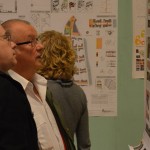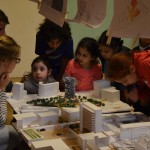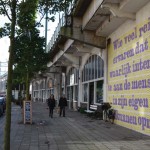On-Site Expo
Hofbogen Project
Exhibition of Design Ideas for the Urban Area around an Abandoned Railway Line at
10th-12th April 2013
`t Lispunt
Nootdorpstraat 6
Rotterdam
This expo exhibits a project focused especially on socio-spatial transformation of the city, as a base for the urban design profession. Nearly two hundred participants illuminate the particular level of scale of the urban project, the scale where urban design meets the human scale. As such, urban design is closely related to (landscape) architecture. By strategically intervening in the urban fabric urban design improves the environment of people in a sustainable and feasible way. These designers understand the design and use of public space in its conjunction to the built programmes, because in the end people make the city.
“Time horizons act upon each other. We select and design plans using multiple perspectives. As part of this we meet a variety of actors on different meeting tables. In every situation, as urban designers, we are equipped with cross-over knowledge and skills in the integral design. While envisioning the future, we are skillful at relating the project to clients and other actors. Over time, we aim for a smooth transition from one plan to another. Yet, we need the crowd. We design for people. Each person, group, community, collective or institution has its own desires. We are not alone. They act in the urban too. Sometimes they do temporal. They organise a fair or a festival. They put their barbecue on the sidewalk and sit down with their neighbours. Sometimes they do on a more permanent basis. Claiming the public space by domestication, planters, benches and terraces may appear. They may redevelop their own premises, creating courts, alleys, playgrounds, passages, arcades, malls, et cetera. They may create public space on the private owned grounds. The urban design could condition this, or at least deal with it and allow the behaviour of someone to do something unexpected. The urban designer designs strategically while continuously controlling, directing, conditioning and allowing urbanisation in all imaginable futures. In the research and design studio, exactly this is questioned.”
text based on, and quoted from:
Harteveld, Maurice (2012, 1 November) Quarter Guide Q2 2012-2013, Socio-Spatial Processes in Urban Societies, Delft: Faculty of Architecture, pp. 5-7
in collaboration with Projectbureau Hofbogen, Neighbourhood Centre `t Lispunt and Welfare North Rotterdam






